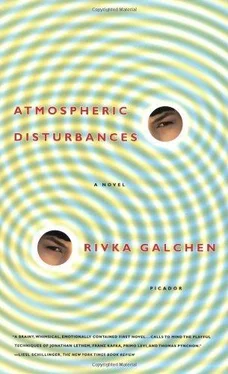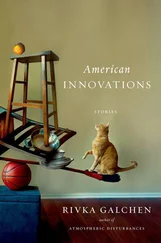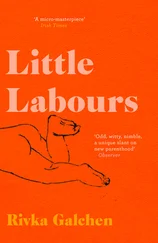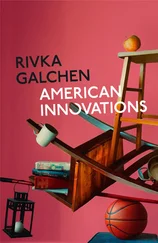“You are completely misunderstanding,” Magda said, breaking into English. “These fantasies of yours are bizarre.” She was not looking at me in the eyes — instead again looking at the cuffs of my shirt. “Anatole,” Magda said, not hesitating in her pronunciation. “Well. He’s. Well, really I feel rather strange saying this. Well, really. Well.” I noticed Magda set down an accordioned tea bag label. Where had that tea bag come from? Neither of us had ordered tea. “Maybe it is wrong that I am the one telling you this. But. Anatole was my husband.”
I guffed just one violent guffaw. But I felt in that instant that I’d lost all that had held me taut, whatever had tirelessly and praiselessly kept the shell of me from collapsing under the pounds of atmospheric pressure.
“Are you choking?” she said with concern, for me I think, more than for herself.
“I’m sorry,” I said. “I’m always hearing the strangest things. Not the things people are actually saying.” I could feel twitching in my face, and itching in my scalp, and laughter in my diaphragm. The room was too much there. I could feel the color of the wallpaper — burgundy — invading.
“You don’t know,” she said, “that Anatole was Rema’s father?”
In the silence that followed I could feel the powdery softness of my button-up shirt, and the fullness of the veins of my feet, and the absence of Rema’s hand on my forehead just where she likes to place it when she stands behind me while I’m seated in a chair and complaining of a headache, and I heard — maybe it was that accordioned tea bag label — a heated kettle, empty of water, not whistling.
I said, “I had a father too.” I don’t know why that is what I said. I find that sort of cheap identification shameful. I then immediately began forking food into my mouth.
“They took Anatole,” Magda said. “Rema was very young.”
10. Primate perturbations
I ate a delicious corn soup that night. Magda’s meal looked tasty as well — a whole fish, head on, grilled — but I did not ask for a bite of it and she did not offer. My mashed potatoes were flavored with garlic and I imagine hers were too, though she did not eat hers while I did eat mine. (Why wasn’t she hungry?) One might be inclined to lend too much importance to Magda’s statements about Anatole. While such statements might be, of course, inherently important, they were not particularly important in my matter, the matter of locating Rema. After all, out of any assembled body of knowledge, there are many possible data points one might dwell on. That is to say, a piece of information may be important in some very local sense, but what does it have to do with, as they say, the price of tea in China? What with the recent discussion of Initial Value Problems, and of the Dopplerganger effect, surely some busybody will feel inclined to make cheap metaphors, or butterfly metaphors, but such metaphors would rely entirely on associations of only apparent depth. Really the details about Anatole were hardly relevant at all to my investigations, and there was no reason to believe they rippled out to increasingly dramatic effect. Never mind that the simulacrum later insisted that Magda was lying to me, that Anatole was not taken at all, that he simply left. Who knows? The point remains the same: people lose parents all the time, and in all sorts of ways, and if I perhaps did not know the very particulars of what had happened with Rema’s father, it’s not as if I didn’t understand Rema herself, understand her entirely, see within her the exact contours of that disappearance even if I didn’t know it was a loss I was looking at. What this — Magda’s statement — was, was not a mésalliance like Rema’s reaction to the threatening letter on mourning, but a misalliance of a different sort, and I was resolved not to let it derail my search, which it could easily have done if poorly interpreted. I was looking for clues that would help me find Rema, and then I stumbled across something resembling the truth about Anatole, which I had briefly mistaken for a truth about the other husband, something sizable, yes, but something I really had no interest in knowing, a stone I had continually, purposively, wisely even, left unturned. A clue, but to a different mystery. Regardless, I didn’t want to know; I am not gentle enough to know such things; perhaps nobody is.
At some point during that meal I remember looking down at my hand, which seemed a terribly hairy paw, reached out from that delicate years-worn cloth.
Magda said to me, “I’m sorry, I did not mean to make you uncomfortable.”
But I wasn’t uncomfortable. Though it’s true that I did fail to offer Magda any comfort whatsoever. Say what you will of me, but I would defend myself on the fact that (1) her grief, if there was any, was none of my business, (2) I could certainly do nothing to alter the etiology of it, (3) “comforting words” snag, like hangnails, and (4) we didn’t have a professional relationship. Also, (5) disappointment distracted me from figuring out what my duties toward Magda might be, disappointment in learning nothing that seemed likely to bring me closer to retrieving Rema. I had been counting on the Anatole clue. Even if just to help me understand how I figured in all this.
Instead of following up on Rema’s father, I eventually reiterated my question about who was the original husband of Rema.
Magda ate the eyeball of her fish. “Ask my daughter yourself. I am living in enough trouble already with that girl and the things that she does and does not want me to say.”
“It was the dog walker?” I said.
“He’s an analyst,” she said.
“The dog walker is? Or the husband is? Or both are?”
“Stop,” she said, closing her eyes, putting her hands to the sides of her face.
I whispered, “Was his name Tzvi?”
“This game is beneath you,” she said, with her ears still covered. “It is, anyway, beneath me. So if you consider me to be beneath you, which you seem to, then I believe it follows that this game is beneath you too.”
11. I always hated musical chairs
Harvey, amidst a mess of room service plates, asked me what I had learned.
“I’m not sure. But I think I’m not the central butterfly. Or I’m not the central man. This Anatole, for example, I wholly misunderstood his significance. And Magda just let me go. It seems like all my assumptions were flawed.”
He asked me if I had learned that Rema was in love with Anatole.
I said no.
“Does the doppelganger love Anatole?”
“Why all this talk about love, Harvey? What’s happening to your interest in the weather?”
“I often find that it’s love that lies at the center of things, don’t you?” he mewed sleepily. “One has to presume that the majority of the 49 Quantum Fathers once belonged to the Royal Academy, belonged until they were somehow burned by love. One of my old therapists pointed that out to me. How chance—”
“That doesn’t sound right to me. Who was this therapist?”
Harvey shrugged. “You’re the one who likes to talk about love to Tzvi.”
“Not about love. About Rema maybe. About the doppelganger a little bit. But only as a kind of evidence.”
“What about that man you told me about who you saw walking dogs? Is that who the doppelganger loves?”
“No, of course she doesn’t love him,” I answered in a quiet, calm, not at all irritated voice. Our room, with all those dirty dishes, had acquired the cheerless look of a bachelor pad. I set myself down in an armchair. I lacked the peace of mind to think of Rema’s father. “What is sad of course is that even in this short time she has fallen in love with me. She can’t stop calling me. So what can she do with her frustrated love for me, a love perpetually unable to reach its object? Maybe she will end up lavishing attention upon that other man simply because, at least superficially, at least in terms of profession, he resembles me, the forbidden fruit.” I felt moved to attempt a love and chance lecture superior to that of his other unnamed therapist. “Maybe that’s happening right now. But he — well, he wouldn’t even really enjoy her attentions, since surely a man with his training would understand her interest in him as nothing more than simple transference, because he must know that a girl like her — I’m sorry, a woman — could never actually be attracted to him unless she was somehow unconsciously mistaking some superficial aspect of him for some earlier true love. He can be nothing more than the illusion of the recovery of that love; he can only be the ersatz love, you see; no other sensible explanation for her affection toward him would exist.” I knew I was going on, but having arrived so dispirited, I now felt compelled to speak from a position of superior knowledge. “In fact, Harvey, this is all rather analogous to how Freud ‘discovered’ transference in the first place. Do you know? He had this experience, early in his career, of this beautiful young woman emerging from hypnosis, throwing her arms around his neck, and kissing him passionately. It haunted him. He felt certain, I suppose, that she couldn’t really have been attracted to him personally, that he must have functioned as a stand-in for someone else. I mean, it’s interesting — if Freud had considered himself attractive, he might never have made his discovery, he simply would have assumed the girl found him straightforwardly alluring. Surely that’s what Jung would have thought. Although Freud takes his idea to an extreme — he seems to think that transference explains the origin of all love, that there’s always a thicket of past people between any two lovers. There I’d have to disagree. As it goes contrary to my own experiences. Freud erred in universalizing his theory. That’s the problem with calling psychoanalysis a science, because science shouldn’t rely on authority, but—”
Читать дальше
Конец ознакомительного отрывка
Купить книгу












